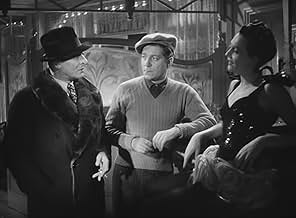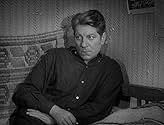Le jour se lève
- 1939
- Tous publics
- 1h 33m
IMDb RATING
7.7/10
8.7K
YOUR RATING
After committing a murder, a man locks himself in his apartment and recollects the events that led him to the killing.After committing a murder, a man locks himself in his apartment and recollects the events that led him to the killing.After committing a murder, a man locks himself in his apartment and recollects the events that led him to the killing.
- Awards
- 1 nomination total
René Génin
- Le concierge
- (as Genin)
Arthur Devère
- Mr. Gerbois
- (as Arthur Devere)
René Bergeron
- Le patron du café
- (as Bergeron)
Marcel Pérès
- Paulo
- (as Peres)
Annie Cariel
- Une locataire
- (uncredited)
Georges Douking
- L'aveugle
- (uncredited)
Georges Gosset
- Un agent
- (uncredited)
- Director
- Writers
- All cast & crew
- Production, box office & more at IMDbPro
Featured reviews
We see a man shot; who he is and why we don't know. The murderer has locked himself inside his room. Police are forced to shoot in, trying to get him to surrender. The story then proceeds in flashback.
Marcel Carné directs this famous French film starring Jean Gabin. The two had worked together the previous year on "Le quai des brumes", a film well known then and now. If you are unfamiliar with Gabin, he was to the late 1930's in France what Bogey would be shortly in America, only Bogey with a soupçon of Cagney. More animated than Bogart, but less than Cagney with his agile song-and-dance-man side. A tough guy who's actually a good guy.
Now, a soft-hearted tough guy who's surrounded by police -- that could also describe Bogart's breakthrough film, "High Sierra", from 1941, and perhaps there is some superficial similarity.
However, this story is mostly a tale of love affairs and working class life -- that's really where its interest lies. There's a real sympathy here for the common man, when even a modest house on a rutted street would seem beyond his reach.
This film's original reputation may have been based at least in part on its Gallic openness about sexual matters. It's quite outré by the Anglo-Saxon standards of 1939. Regardless, the justly celebrated "Le jour se lève" has a poetic quality overall, and a memorably ironic final shot of the kind we don't seem to see quite often enough anymore.
Marcel Carné directs this famous French film starring Jean Gabin. The two had worked together the previous year on "Le quai des brumes", a film well known then and now. If you are unfamiliar with Gabin, he was to the late 1930's in France what Bogey would be shortly in America, only Bogey with a soupçon of Cagney. More animated than Bogart, but less than Cagney with his agile song-and-dance-man side. A tough guy who's actually a good guy.
Now, a soft-hearted tough guy who's surrounded by police -- that could also describe Bogart's breakthrough film, "High Sierra", from 1941, and perhaps there is some superficial similarity.
However, this story is mostly a tale of love affairs and working class life -- that's really where its interest lies. There's a real sympathy here for the common man, when even a modest house on a rutted street would seem beyond his reach.
This film's original reputation may have been based at least in part on its Gallic openness about sexual matters. It's quite outré by the Anglo-Saxon standards of 1939. Regardless, the justly celebrated "Le jour se lève" has a poetic quality overall, and a memorably ironic final shot of the kind we don't seem to see quite often enough anymore.
Told in flashbacks, the story slowly enfolds to explain the death that started the movie. A very touching love story. The guy is just trying to find a little love in his daily struggle to work a dead end job and make ends meet. There is miscommunication between some couples. Characters are unsure about what it is they really want out of life. Events lead tragically to a death. Trapped in his room by the police, the crowd responds with varying degrees of sympathy and confusion. Was the death inevitable? Those are the questions. In the end, you understand how the situation could have ended differently. You will enjoy this movie.
the main setting of "le Jour Se Leve" is the top floor of a french apartment. the film opens with Jean Gabin character Francois - a factory worker- killing a dog trainer named Valentin who we find out (as the story unravels itself) was "involved" with his girl. Francois then barricades himself from the police, and the reason for the death of Valentin is told in simple sets of flashbacks that Gabin remembers between cigarettes as he decides what his next move will be. the story is simple and delicate in manner and substance but nonetheless the director/writer team Marcel Carne and Jacques Prevert succeed in turning the realistic (and sometimes edgy) conversations, movements and places into poetry. and in response to an earlier review, the simplicity of the flashbacks, is what makes the movie so intriguing. instead of relying on a heavy plot that might challenge audience, Prevert and Carne decide to put great detail into a simple tale about a sentimental man who is torn to ruin by a contemptuous and Machiavellian man.
French cinema at its best. Ideas of freedom, entrapment, isolation and realism wound into a great film which is carried by Gabin from the opening scene of the murder, through flashbacks he has remembered to the amazingly brutal final shot. Gabin and Laurent in the factory near the beginning of the movie is poetic realism at its most involving.
A fantastic film, which plays with the emotions of the spectator while stunningly portraying the feelings of a pent-up man whose end echoes his pent-up life in the city. The film is beautifully shot in black and white and is a perfect example of French realism, with a modernist time disorientation tossed in for good measure. I found the performances by Jean Gabin and a showgirl with whom he gets involved (played by Arletty)to be strong, portrayed with a kind of hopeless, clutching pathos. Worth it simply for the beautifully constructed final shot.
Did you know
- TriviaWhile not the first film to use dissolves to represent flashbacks, it was considered too new a method in the language of cinema that its producers' insisted on pre-title cards to avoid any confusion.
- Quotes
M. Valentin: You're the type women fall in love with . . . I'm the type that interests them.
- ConnectionsFeatured in Un compositeur pour le cinéma: Maurice Jaubert (1985)
- How long is Daybreak?Powered by Alexa
Details
Box office
- Gross US & Canada
- $35,321
- Opening weekend US & Canada
- $11,864
- Nov 16, 2014
- Gross worldwide
- $35,321
- Runtime
- 1h 33m(93 min)
- Color
- Aspect ratio
- 1.37 : 1
Contribute to this page
Suggest an edit or add missing content






























